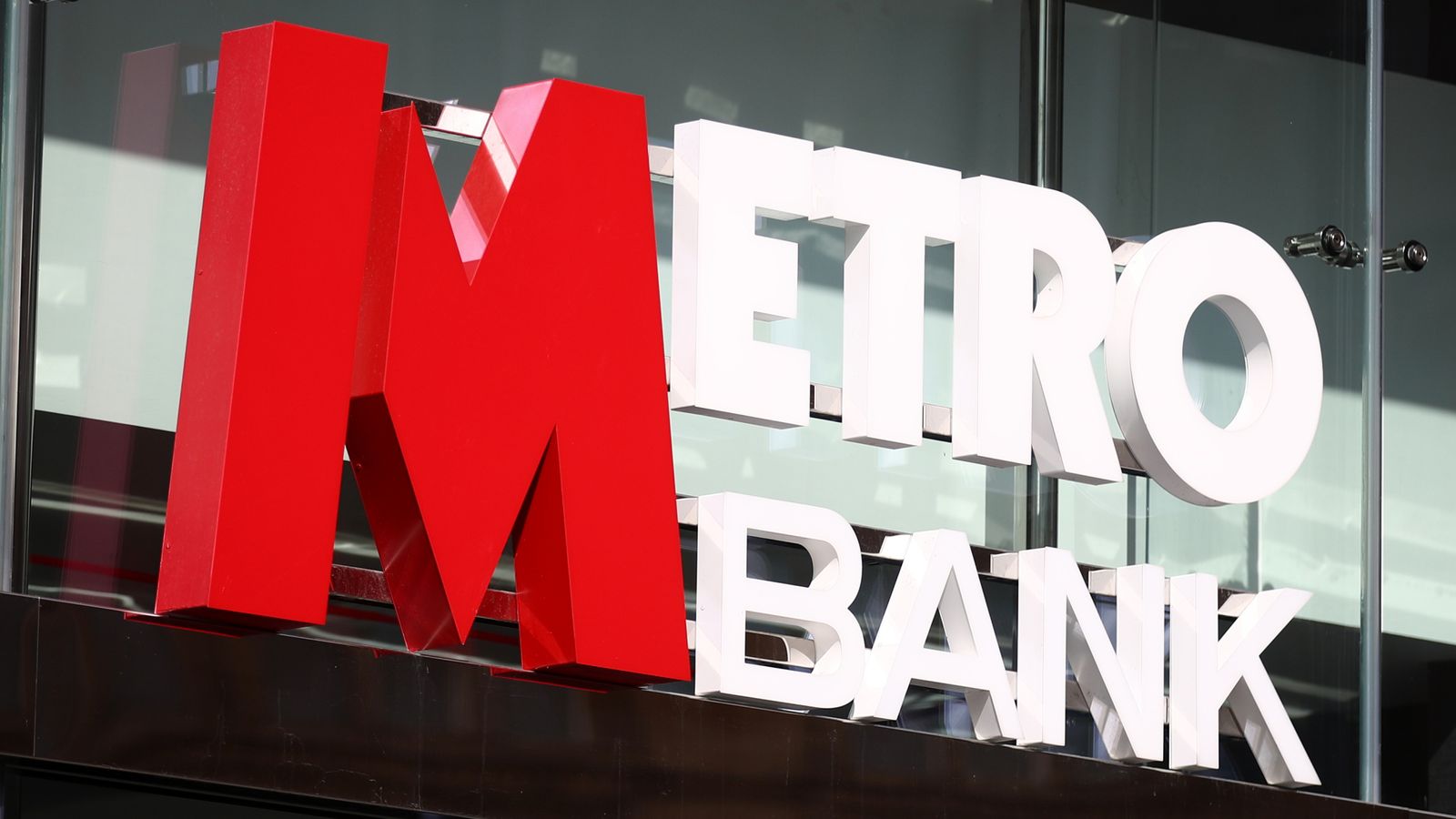Metro Bank has kicked off talks about the sale of a £3bn chunk of its mortgage book as part of an increasingly urgent attempt to shore up its fragile balance sheet.
Sky News has learnt that advisers to Metro Bank – which saw its shares plunge on Thursday after acknowledging that it was seeking to raise new capital – have this week contacted a string of potential buyers of the assets.
Those sounded out by the London-listed high street lender included Lloyds Banking Group and NatWest Group, according to City sources.
One insider said the sale process for the Metro Bank mortgages was designed to form part of a wider capital-raising exercise.
This, as Sky News revealed on Wednesday, would include raising more than £100m of new equity and refinancing a £350m debt instrument which falls due in 12 months time.
However, the share sale element of that plan has been rendered significantly more difficult by the 30% decline in Metro Bank’s stock, which has left it with a market value of well under £100m.
Selling the mortgage assets would reduce its earnings but also sharply reduce the amount of capital it is forced to hold.
It was unclear on Thursday whether Lloyds and NatWest were interested in acquiring the loan-book or what price they would be prepared to pay.
In a statement confirming its exploration of strategic options, Metro Bank said: “The company is evaluating the merits of a range of options, including a combination of equity issuance, debt issuance and/or refinancing and asset sales.
“No decision has been made on whether to proceed with any of these options.”
City analysts took a bearish view of Metro Bank’s prospects, raising the possibility of it being forcibly taken over or collapsing.
In a research note headlined ‘Is failure imminent?’, Gary Greenwood at Shore Capital said the bank was “in a very tricky situation”.
“Without a capital raise it will not be able to grow its loanbook and so will struggle to build profitability, while continuing to operate so close to regulatory minimum requirements is likely to unsettle depositors, in our view, and potentially lead to material deposit outflows,” he wrote.
“The group needs to move fast to shore up its balance sheet.
“If it cannot convince the regulator it can deliver, it may find matters are taken out of its own hands.”
Metro Bank, which has about 2.7 million customers, became the first new lender to open on Britain’s high streets in over 100 years when it launched in 2010.
It offers current accounts, business accounts, personal loans and insurance products, and employs about 4,000 people, operating from about 75 branches across the country.
It has hired bankers at Morgan Stanley to work on the capital-raising plans, while Moelis, another investment bank, is acting as debt adviser to the company.
Royal Bank of Canada, Metro Bank’s corporate broker, is also involved in the equity-raise.
Metro Bank’s board, which is chaired by Robert Sharpe, a veteran banker, is exploring a range of options which may ultimately include a sale of the company.
Shares in Metro Bank have more than halved during the last month to leave it with a market capitalisation of not much more than £50m, having been valued at about £3.5bn at its peak in 2018.
Banking regulators and the Treasury are closely monitoring Metro Bank’s capital-raising plans.
While there is no suggestion that it is at risk of imminent collapse, rumours have circulated for years about its finances.
In 2019, customers formed sizeable queues at some of its branches after suggestions circulated on social media that it was in financial distress.
Days later, it unveiled a £350m share placing in a move designed to allay such concerns.
News of Metro Bank’s efforts to secure a new capital injection comes weeks after it was dealt a severe blow by the Prudential Regulation Authority (PRA), which supervises British banks’ capital and solvency.
In mid-September, it announced to the London stock market that the PRA had informed it that it would not gain approval this year for an internal ratings-based model allowing it to hold less capital against its mortgage assets.
Metro Bank has had a chequered history with City regulators, despite its relatively brief existence.
Last December, it was fined £10m by the Financial Conduct Authority for publishing incorrect information to investors, while the PRA slapped it with a £5.4m penalty for similar infringements a year earlier.
The lender was founded in 2009 by Anthony Thompson, a financial services entrepreneur, and Vernon Hill, an American who eventually left in controversial circumstances in 2019.
Metro Bank has been forced to sell assets in the past, announcing a deal in December 2020 to sell a portfolio of owner-occupied residential mortgages to NatWest Group for up to £3.1bn.
Metro Bank has been contacted for comment on the potential mortgage book sale.
